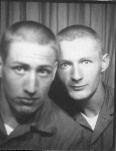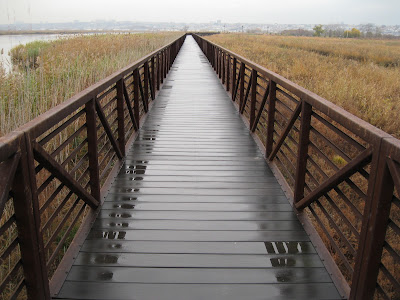Chapter 29: Strangers once more
The stirring started as soon as the bus passed the sign saying: Los Angeles 50 miles.
Hands gripping the arms of seats as passengers rose up into the aisle, unsnapping and re-snapping the latches to luggage in the overhead racks, some cases thudding on the floor as they dragged them down.
Fifty miles could have been fifty million as the landscape outside changed, city lights filling the darkness where cactus had been, growing closer together from remote collections of buildings into the first semblance of city, the rumble of wheels changing, too, from the ragged beat of dessert miles to the steady hum of well-paved throughways. Faster moving cars so remote previously, roared by us, leaving a stream of exhaust behind, horns blaring at slower moving cars that clung stubbornly to the slow lanes the hotrodders claimed as their own.
Outside grew brighter as city rose like a false dawn many hours away, yet irresistible, drawing the attention of even the sleepiest of us, gazes looking for the next sign and then the next, an anxious mumbling starting that I knew would not stop until the bus did.
If anyone still slept, I didn’t see them.
Somewhere a few seats behind me some was again reading from some guide book about the city we now entered, talking about the earliest inhabitants here, a small tribe of Shoshone indians who somehow survived the spread of power of larger tribes to the north and south, as if this valley had powers to resist invasion, giving way only when the Spanish and their missionaries came, missionaries who killed them with kindness, then buried the bodies in mass graves while blessing their souls to God.
But there was always plenty of blame to go around, outraged savages returning this blessing by attacking the defenseless souls who made their way here with more legitimate hope of a new life, Spanish, Mexican, whites, Chinese even former slaves, cast into the same pit with dead and dying natives, a non-stop blood bath which made the blood feuds of Appalachian hillbillies look tame, history, written by ivory tower professors, taking aim at those who managed to survive, and later thrive.
The concept of the ranch evolved here, a Spanish equivalent to the Southern plantation, where wealthy Spanish families oversaw the rise of crops and cattle, families who proved that California could turn a profit, and thus brought doom down upon itself as Americans from the East invaded, not with armies, but with settlers, expanding the population to a point in which he became more American than Spanish, and by default, a state in the Union.
When Commodore R.F. Stockton sailed in San Francisco harbor in 1846 with his military contingent, California had long been in American hands -- especially Los Angeles -- needing only the treaty with Mexico to make it official.
The discovery of gold in the mountains north and east of Los Angeles and oil in the valley itself, guaranteed a continued growth of population, making the city the second largest in the country by the turn of the century. Hollywood's movie industry gave it a sparkle as grand as gold, stealing the industry from New York City along with a good chunk of New York's population.
The guide book didn't talk about the Watts riots had had left a good portion of the city in flames, or the rock bands that emerged out of a growing scene on Sunset Strip, or the fascination by the hippies for a ten-block section of Hollywood Boulevard, which I was about to discover for myself, as just one more invader from the East.
I stop listening to the continued diatribe, lulled into a daze by the rumble of the wheels, and the hum of the bus’s air-conditioning. Somewhere in the back, one of the younger people had turned out a radio, picking up tunes from one of LA’s pop station, the disc jockey – while not Cousin Bruce from back east, enough alike him to almost make me feel at home, the chant of the pop culture, full of breaking new tunes and golden oldies, with advertising about fairs and concerts, cigarettes and cars stuffed in between.
I stared out the window and continued my countdown of milage markers, as if counting down the launch of a new moon mission with me as the principal astronaut.
We were about to land in a place I had only dreamed about, and I was so nervous, I couldn’t keep t my seat. I made frequent trips to the toilet, even though I had already expelled everything I had eaten or drank since before Phoenix.
The glitter of lights of L.A.'s suburbs flickered in the descending hills and over the wide valley like so many fire flies, a spreading new kind of nature natural only to L.A.
Streams of car lights smeared the freeway ahead and behind us, as if we were floating on a log inevitably drawn to the heart of this place, mile by anxious mile.
I wasn’t alone in being nervous. Everyone seemed to be as anxious as I was, perhaps because of three days together we had become a small society of our own, growing familiar if not friendly to each other, tolerating each other’s bad breathe and bad habits, thinking ahead to where we were going, but so caught up with the spinning wheels of the bus beneath us, we almost didn’t believe it would come to an end, and now, as we neared our destination, we had to divorce ourselves, and plan for when we would all get on with our own lives without each other.
One of the passengers came up with the idea of taking a collection for the driver and hostess as thanks for bringing us safely to our destination, despite the fact we had gone through more than a dozen different drivers and hostesses since leaving the east.
A hat went around, people shoved bills into it with the Wartons the most vocal about their contribution.
And just like that, we were in L.A., the bus rolling off the freeway and onto the city streets of a downtown that looked at dismal as those that I had left back east, narrow allies filled with trash cans and litter, and hobos pushing shopping carts loaded heavily with useless junk over cobble stone, the rattle of which echoed like strange music.
Inside the bus, the passengers once again went through the ritual of pulling luggage from the overhead racks, this time for the last time, banging the seats, grumbling as the studied the rack and then the seats for any small item they might have left behind, their voices a murmur of concern as they slid out of their seats as the bus slid into a slot inside the station.
The stench of bus fumes invaded the interior of the bus through the vents, thick with the same heavy scent I was so familiar with from the Port Authority in New York, as if we had not gone 3,000 miles, but had circled the globe and returned to our point of origin, the same slanted slot for the buses, and the same exhaust-stained glass smeared with years of coming and going. We could see nothing beyond except the vague ghostly shape of people moving around inside the terminal.
I sat silent, aware for the first time the lack of motion. After 3,000 miles of rubber meeting the road, I felt still, knowing that I would not be setting off again, knowing that vibrations that ceased only at each rest stop had finally come to an end.
While everybody scrambled to get up and out, I remained fixed in my seat, waiting for the parade to pass by so I could reach up and get my things from the rack. I looked at no one and none looked at me. We were all strangers again and for some reason that seemed fitting and proper.



Comments
Post a Comment